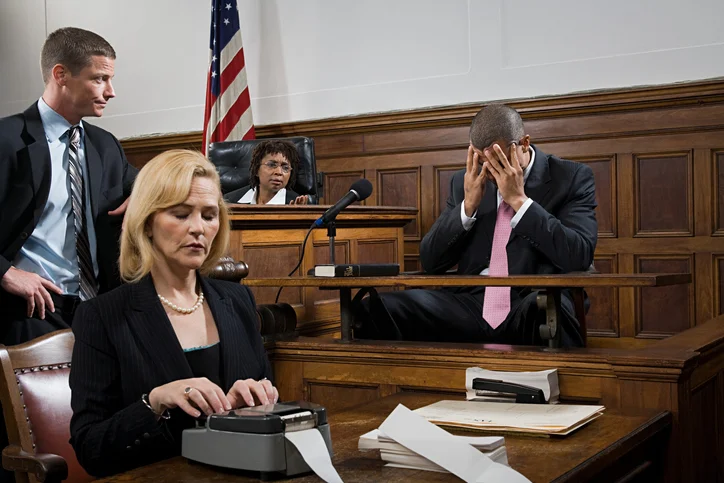Court Reporting for Law Firms-- Enhancing Precision and Effectiveness
Court Reporting for Law Firms-- Enhancing Precision and Effectiveness
Blog Article
Understanding the Value of Court Reporting in Legal Provider and Proceedings
Court coverage plays a critical role in the legal landscape, serving as the foundation of precise documentation in different lawful procedures. By offering verbatim transcripts, court press reporters make certain that every testament and argument is thoroughly captured, thus protecting the integrity of the judicial process.
Duty of Court Reporters

Along with transcription, stenotype reporter are commonly tasked with handling and keeping the circulation of process. They must excel in lawful terms and have a detailed understanding of courtroom methods to make certain that the document reflects the context and subtleties of the discussion. Their job may also extend beyond standard court rooms, incorporating management hearings, arbitrations, and various other lawful settings where paperwork is essential.
Furthermore, stenotype reporter may give real-time reporting, enabling instant access to records throughout procedures, which can be vital for the efficient management of justice. By making sure that an accurate record is preserved, court press reporters copyright the integrity of the lawful process, offering and assisting in charms as a vital resource for lawyers in their search of justice.
Value of Accuracy

The duty of precision extends beyond mere transcription; it incorporates the capability to catch the nuances of speech, consisting of tone, focus, and non-verbal cues, which can be essential in understanding the context of statements made. A specific record guarantees that all events involved-- judges, courts, and lawyers-- have accessibility to the same details, promoting fairness and openness in the judicial process.
Furthermore, precise records are vital for the appellate procedure, where greater courts count on them to evaluate reduced court decisions. Errors can jeopardize the end result of a charm, potentially influencing a party's freedoms and civil liberties. Thus, the commitment to precision in court coverage is not just a specialist obligation however a cornerstone of justice that maintains the rule of law.
Sorts Of Lawful Proceedings
Covering a large variety of lawful contexts, stenotype reporter are necessary in various kinds of lawful process, each needing unique approaches and skills. Among one of the most usual types are civil litigation, criminal tests, and management hearings. In civil lawsuits, stenotype reporter catch testimonies, movements, and depositions, making certain that every information is documented properly for prospective allures or settlements.
In criminal trials, the function of court reporters becomes much more crucial, as they record all elements of the process, including jury choices, witness testaments, and punishing phases - Court Reporting. The precision and immediacy of these records are critical, given the potential consequences for offenders and the stability of the judicial system
Administrative hearings, commonly conducted by governmental companies, also count on stenotype reporter to maintain official records of proceedings. These hearings can entail disputes concerning regulative compliance, employment issues, or expert licensing, requiring precise paperwork.
Additionally, specialized procedures such as settlement and mediation need stenotype reporter to record the subtleties of arrangements and negotiations. Each sort of legal case provides unique obstacles, underscoring the relevance of seasoned court press reporters in maintaining the stability of the lawful procedure.
Innovation in Court Reporting
Advancements in technology have actually revolutionized the field of court coverage, boosting both effectiveness and accuracy in the transcription process. Conventional methods of manual note-taking have actually been supplemented and, in many cases, replaced by innovative electronic devices that improve workflows and improve precision (Court Reporting). Court press reporters currently use innovative steno devices geared up with real-time transcription abilities, permitting for instant access to news a verbatim account of process
Additionally, the combination of speech acknowledgment software application has actually further changed the coverage landscape. This technology enables the automatic transcription of talked words, considerably lowering the time needed for producing official documents. Furthermore, cloud-based platforms promote simple storage space and retrieval of records, making certain that attorneys can access crucial files from anywhere, any time.
Video clip conferencing tools have likewise emerged as important elements in remote depositions and hearings, assisting stenotype reporter capture procedures in real-time, no matter area. The mix of these technical advancements not only boosts the precision of legal paperwork yet also sustains a more effective and adaptable legal process. As the area remains to evolve, welcoming these innovations will certainly be essential in meeting the growing needs of the lawful sector.
Moral Factors To Consider in Coverage
The combination of modern technology in court coverage brings with it a collection of moral factors to consider that professionals must browse carefully. As stenotype reporter increasingly utilize digital tools, concerns bordering stability, confidentiality, and precision concern the center. Protecting sensitive details is extremely important; press reporters need to make certain that any digital documents are securely saved and shared just with accredited people.
Additionally, the accuracy of transcriptions is critical. Utilizing software program for real-time reporting does not discharge court press reporters from the responsibility of making certain that the final product is exact. Moral responsibilities dictate that any type of errors have to be immediately dealt with and connected to pertinent parties.

Last but not least, compliance with lawful standards his response and market laws is important. Stenotype reporter should remain informed regarding progressing moral standards to maintain the count on placed in them by the lawful system. By addressing these honest considerations, court press reporters can proceed to supply invaluable services in lawful proceedings while keeping public self-confidence.
Verdict
In conclusion, court reporting plays an essential duty in the lawful system by making certain exact and reputable documentation of judicial process. The thorough work of court reporters promotes the stability of the lawful process and sustains the rights of individuals included. The combination of innovation enhances efficiency while keeping ethical criteria. Eventually, the relevance of court reporting can not be overemphasized, as it acts as an important structure for fairness, transparency, and the reliable administration of justice.
Court coverage plays a critical role in the legal landscape, offering as the foundation of accurate documentation in different lawful process.Court reporters consistently play a vital function in the judicial process by developing precise, verbatim records of legal procedures.Furthermore, exact transcripts are important for the appellate process, where greater courts Source rely on them to evaluate reduced court decisions.Covering a broad selection of lawful contexts, court press reporters are crucial in numerous kinds of lawful process, each requiring unique approaches and skills. By resolving these moral factors to consider, court press reporters can continue to offer indispensable services in legal proceedings while preserving public self-confidence.
Report this page